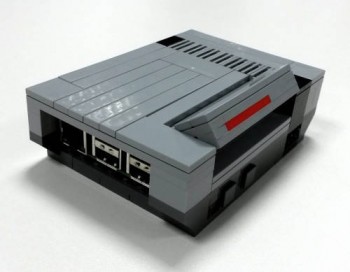The Raspberry Pi Report
It’s beyond amazing how many different projects people have created for the Raspberry Pi. Here’s a look at four which are particularly noteworthy.
Well ladies and gentlemen, it’s the end of March. Normally this last-of-the-month article would be a summary of the biggest stories that happened during the month of March concerning the Raspberry Pi. This month, though, I thought I would change it up and discuss some of the biggest projects that were talked about this past month. In no particular order, here is what the month of March had to offer in the way of amazing DIY Raspberry Pi projects.
 Lego NesPi case: One of the best things about the Raspberry Pi is that it comes bare bones without a case. This allows Raspberry Pi users the opportunity to put their own unique touch to the Raspberry Pi by creating their own cases, or to buy the one case that stands out from the rest, like maybe the NesPi. Created by the Spanish company RaspiPC.es, the NesPi case is a Lego case that looks exactly like the original Nintendo. Once built, the case will leave openings for all Raspberry Pi ports to be accessible and it is even compatible with the Raspberry Pi 3. For about $32 US, you will receive 108 pieces and a 30 page color manual which will guide you as you construct the hottest Raspberry Pi case around.
Lego NesPi case: One of the best things about the Raspberry Pi is that it comes bare bones without a case. This allows Raspberry Pi users the opportunity to put their own unique touch to the Raspberry Pi by creating their own cases, or to buy the one case that stands out from the rest, like maybe the NesPi. Created by the Spanish company RaspiPC.es, the NesPi case is a Lego case that looks exactly like the original Nintendo. Once built, the case will leave openings for all Raspberry Pi ports to be accessible and it is even compatible with the Raspberry Pi 3. For about $32 US, you will receive 108 pieces and a 30 page color manual which will guide you as you construct the hottest Raspberry Pi case around.
Tiny Game Boy: My first article for FOSS Force was all about how the Raspberry Pi has inspired today’s youth to push the limits of technology and imagination. If you need proof, then check out this project by Rasmus Hauschild. A 14-year-old, Rasmus has built a portable Raspberry Pi that looks like a tiny Game Boy. Not only does it look it, but it also emulates as a Game Boy by running RetroPie and functions perfectly through Rasmus’ custom built-in controller. Rasmus has provided two options for those who would love to own one. You can either buy one from him directly, with the option for custom colors and preinstalled emulators, or you can create your own, for which Rasmus has provided the necessary files for the project. Both options can be found on his thingiverse page.
Braille reader: It is easy to take things for granted or not pay attention to certain issues when they do not pertain to you on a daily basis. If you were to talk to me about the cost of braille reading machines, I wouldn’t know where to even start, because braille reading machines are things that I rarely think about. But for those who are blind or work to help the blind, braille reading machines would definitely be on the agenda, with some concern over the cost, which is what Bristol Braille Technology (BBT) is looking to fix. While most of the tech world has gotten very inexpensive, the same cannot be said about braille machines. BBT looks to buck the trend in expensive braille machines with Canute, an inexpensive braille e-reader powered by a Raspberry Pi. By using the Raspberry Pi, BBT has been able to create a smaller and cost-efficient machine that rivals the cost of any given tablet.
Steam-powered Raspberry Pi: This project gives us a small glimpse of a time when steam powered engines ruled the world. A user going by the handle “Alexzpro” managed to provide power to a Raspberry Pi Zero by way of steam. Alexzpro’s machine creates steam that is fed to a cylinder engine that drives pistons. Those pistons turn a crankshaft, which powers a small DC motor. This project has left me speechless from beginning to end, and it serves as a testament to the versatility of the Raspberry Pi.
While there were many, many more projects that appeared or were talked about during the month of March, these were the ones that really stood out to me. If you have a project that you would like to hear more about, or one that you created and would like for more people to hear about, then please leave me a comment.
In addition to hosting a Raspberry Pi meetup in Washington D.C., Isaac Carter is a co-host on mintCast. He’s also a software engineer who enjoys working with Java, JavaScript, and GNU/Linux. When he’s not coding, you can find him reading on any number of subjects or on the golf course.



